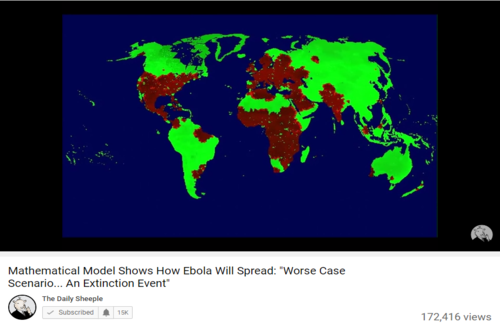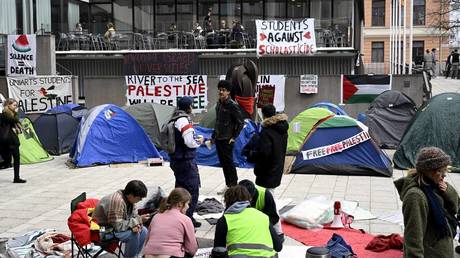Video Shows How ‘Mass Carnage’ Could Spread Across Planet In This ‘Worst Case Scenario’: An ‘Extinction Level Event’ – More Proof Big Cities Will Become ‘Sector’s Of Destruction’ In SHTF
by Stefan Stanford, All News Pipeline:
 Doctor Warns: This Could Be An ‘Alarming Start To Larger Outbreak That Will Continue For Some Time’
Doctor Warns: This Could Be An ‘Alarming Start To Larger Outbreak That Will Continue For Some Time’
Just in time to kick off the summer travel and vacation season, ebola is back in the news again after an outbreak of at least 29 cases in a very short period of time in the Democratic Republic of Congo (DRC). And while at least 3 people have died from the disease in less than a month, the Center for Disease Control has not yet issued a travel advisory, still mulling over the issue, at a time when the World Health Organization is still being criticized for responding too slowly to a 2014 outbreak of ebola in West Africa that left more than 11,000 people dead.
While 2017’s ebola outbreak has yet to spread outside of the DRC, medical experts warn that if it were to spread outside of the country any time soon, “it might mean an alarming start to a larger outbreak that will continue for some time”. In the 3rd video below, we see a mathematical model showing how ebola could spread in a worst case scenario, ebola going airborne which could become an ‘extinction level event’, while the rest of this story looks at the new spread of ebola and experts fears that a deadly pandemic is still ahead of us – possibly one created by man. First, from Newsweek:
Dr. Daniel Lucey, a spokesperson for the Infectious Diseases Society of America, an Ebola expert and senior scholar with the O’Neill Institute for National and Global Health Law at Georgetown University says the 2014 epidemic in West Africa that sickened 28,646 and killed 11,323 as of March 2016 taught us that the virus becomes more difficult to contain once it shows up in a new country. That outbreak which was said to begin in Guinea spread in a matter of months to Liberia and Sierra Leone.
“The crossing of borders means you have to have a regional response and not just a national response. It adds another layer,” says Lucey. Handling any outbreak of an infectious disease takes huge coordination between public health officials, health care workers, local governments and international organizations. “That can be hard to do for one country, but then you have to do it for two or three it’s a new level of complexity.”

As the WHO recently tweeted, the full extent of the 2017 ebola outbreak is still not yet clear but it is clear the 2014 outbreak is still on their minds. As we also hear in the 2nd video below, some are already talking about a vaccine to help stop the spread of this latest ebola outbreak. Does Bill Gates’ latest warning come to mind? More on that later.
In 2014, more than 11,300 people were killed in the worst-ever outbreak of the virus in West Africa, most of them in Guinea, Sierra Leone and Liberia. During that outbreak, which WHO declared a “public health emergency of international concern,” the Western Hemisphere also saw its first Ebola patients.
Seven Americans who had been working in Africa became infected and were transported to the United States for treatment. In addition, two American nurses were infected after caring for a Liberian man who died from the virus in the hospital where they worked in Texas.
According to health experts interviewed in this April of 2017 story at globalist-news CNN, “there will be a pandemic”. Sharing within their story 7 reasons why we’re more at risk now than ever of a global pandemic, we see once again how ‘population density’ sets up Americans to be sitting ducks once the next ‘Spanish flu’ arrives.
Claiming that cities are breeding grounds for such an infection, we see in the chart below how rising populations increase the potential of epidemics and give us another reason to get out of the cities.
It could take just one cough, one kiss, one touch or even one bite to change not only your life, but the lives of everyone around you — and for months or even years.
In most cases, the closer those people are to you, the greater the risk. But it isn’t always that simple.
The risk at hand: an infectious outbreak.



